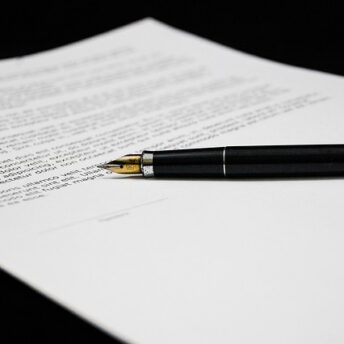In this article, we’re focusing on a crucial aspect of setting up a Lasting Power of Attorney (LPA) — who can act as a witness. The witnessing process is a fundamental step in making your LPA legally valid, and understanding the requirements can help ensure everything is done correctly. At Blackstone Solicitors, we aim to guide you through this important process with clarity and precision.
Please click here to find out more about our Wills and Lasting Power of Attorney Services.
Free Initial Telephone Discussion
For a free initial discussion on how we can help you deal with the legal implications of creating a lasting power of attorney, get in touch with us today. We are also experienced in dealing with all aspects of Wills and Probate and we will review your situation and discuss the options open to you in a clear and approachable manner. Early expert legal assistance can help ensure you avoid the stress of dealing with these issues on your own. Simply call us on 0345 901 0445 or click here to make a free enquiry and a member of the team will get back to you.
What is a Lasting Power of Attorney (LPA)?
Before diving into the specifics of witnessing an LPA, let’s quickly revisit what an LPA is. A Lasting Power of Attorney is a legal document that allows you to appoint someone (an attorney) to make decisions on your behalf if you become unable to do so yourself. There are two main types of LPAs:
- Health and Welfare LPA: This allows your attorney to make decisions about your medical care, living arrangements, and other personal matters if you are unable to make these decisions yourself.
- Property and Financial Affairs LPA: This authorises your attorney to handle your financial matters, such as managing bank accounts, paying bills, and making investments.
The Role of Witnesses in the LPA Process
For an LPA to be valid, it must be signed and witnessed according to specific legal requirements. Witnesses play a critical role in ensuring that the LPA is executed correctly and that the person creating the LPA (the donor) is doing so voluntarily and with full understanding. Here’s a detailed look at who can and cannot act as a witness.
Who Can Witness an LPA?
- General Requirements
Witnesses must be independent individuals who are not related to you or your attorneys. They must also be over 18 years old. Here are the main categories of acceptable witnesses:
– Solicitors: A solicitor is a qualified legal professional who can act as a witness. Their role includes verifying the identity of the person signing the LPA and ensuring that the document meets all legal requirements.
– Notaries Public: Notaries are professionals who authenticate documents and can serve as witnesses for LPAs. They provide a formal assurance of the document’s authenticity.
– Commissioners for Oaths: These individuals are authorised to witness and certify documents. They are often solicitors or legal professionals with specific training in witnessing legal documents.
– Accountants: Chartered accountants or those registered with professional bodies can witness LPAs. Their professional standing helps ensure the authenticity of the document.
– Medical Professionals: Certain medical professionals, such as doctors or registered nurses, can act as witnesses. They are considered suitable because of their professional qualifications and ability to understand the significance of the LPA.
– Public Sector Employees: Employees of local authorities, police officers, or those holding positions of authority in the public sector may also act as witnesses.
Who Cannot Witness an LPA?
To ensure the validity of your LPA, it’s important to avoid using individuals who are not permitted to witness the document. Witnesses who are not allowed include:
- Family Members: Relatives or close family members cannot act as witnesses. This includes parents, siblings, children, and spouses. The requirement for independent witnessing helps prevent potential conflicts of interest and ensures that the process is impartial.
- Attorneys or Their Close Relatives: Individuals who are named as attorneys in the LPA, or their close relatives, cannot act as witnesses. This rule is in place to prevent any undue influence or coercion in the creation of the LPA.
- Beneficiaries: People who stand to benefit from your estate or the decisions made by your attorneys cannot witness your LPA. This helps to ensure that the witness is unbiased and not influenced by the potential outcomes of the LPA.
- Minors: Anyone under the age of 18 is not eligible to act as a witness. Witnesses must be adults who are capable of understanding the importance of the LPA and the process involved.
The Witnessing Process
The witnessing process for an LPA involves several key steps:
- Complete the LPA Forms
First, you need to complete the LPA forms accurately, including information about yourself, your chosen attorneys, and any specific instructions you wish to include. Ensure all sections are filled out correctly before proceeding to the witnessing stage.
- Arrange for Witnessing
Choose a suitable witness from the list of acceptable individuals. Arrange a meeting where the witness can observe you signing the LPA documents. Remember, the witness must be present when you sign the forms to validate the process.
- Sign the Documents
Sign the LPA forms in the presence of your chosen witness. The witness will then sign the document to confirm that they observed your signature and that you understood the nature of the LPA.
- Certificate Provider
For the LPA to be valid, it must also include a certificate provider’s statement. This is a separate individual who confirms that you understand the implications of the LPA and are not under any undue pressure. The certificate provider should also be independent of the attorneys and their close family members.
- Submit the LPA for Registration
After signing and witnessing, you need to submit your LPA to the Office of the Public Guardian (OPG) for registration. This is an essential step to make the LPA legally effective. There is a registration fee of £82 per LPA.
Common Mistakes to Avoid
When arranging for witnesses, be mindful of these common pitfalls:
- Choosing an Ineligible Witness: Ensure that the individual you choose meets all the criteria for an acceptable witness. Using an ineligible witness can result in delays or rejection of your LPA.
- Incorrect Completion: Double-check that all sections of the LPA form are completed accurately before signing and witnessing. Incomplete or incorrect forms may not be accepted by the OPG.
- Lack of Understanding: Make sure your chosen witness understands their role in the process. They should be aware of the importance of the LPA and the necessity of their impartiality.
Conclusion
Witnessing is a vital step in the process of creating a Lasting Power of Attorney. Choosing the right witness ensures that your LPA is legally valid and reflects your wishes accurately. While you can certainly arrange for a witness yourself, it’s often beneficial to seek professional advice to navigate this process smoothly.
How we can help
We have a proven track-record of helping clients create a lasting power of attorney. This also includes all the different types, even if you need more than one. We are a multidisciplinary firm and have all the expertise inhouse to satisfy the most exacting requirements of our clients. We will guide you through all the necessary legal due diligence in a comprehensive and timely manner. We firmly believe that with the right solicitors by your side, the entire process will seem more manageable and far less daunting.
How to Contact Our Wills and Probate Solicitors
It is important for you to be well informed about the issues and possible implications of creating a Lasting Power of Attorney. However, expert legal support is crucial in terms of ensuring your wishes are met as you would want them to be.
To speak to our Wills and Probate solicitors today, simply call us on 0345 901 0445, or click here to make a free enquiry. We are well known across the country and can assist wherever you are based. We also have offices based in Cheshire and London.
Disclaimer: This article provides general information only and does not constitute legal advice on any individual circumstances.





